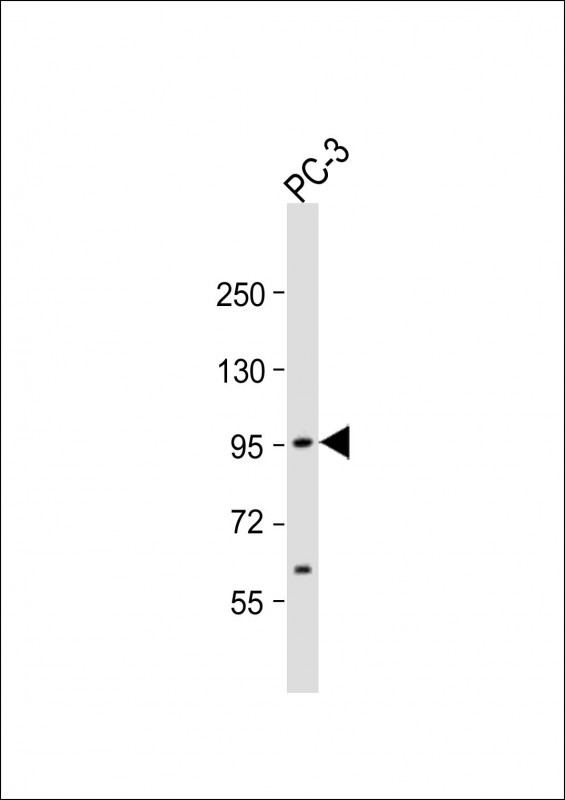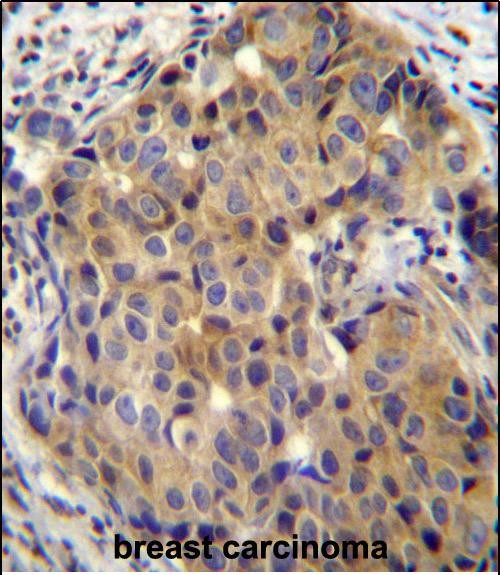ST14 Antibody (C-term)
Affinity Purified Rabbit Polyclonal Antibody (Pab)
- SPECIFICATION
- CITATIONS
- PROTOCOLS
- BACKGROUND

Application
| WB, IHC-P, E |
|---|---|
| Primary Accession | Q9Y5Y6 |
| Other Accession | NP_068813 |
| Reactivity | Human, Mouse |
| Host | Rabbit |
| Clonality | Polyclonal |
| Isotype | Rabbit IgG |
| Calculated MW | 94770 Da |
| Antigen Region | 826-855 aa |
| Gene ID | 6768 |
|---|---|
| Other Names | Suppressor of tumorigenicity 14 protein, Matriptase, Membrane-type serine protease 1, MT-SP1, Prostamin, Serine protease 14, Serine protease TADG-15, Tumor-associated differentially-expressed gene 15 protein, ST14, PRSS14, SNC19, TADG15 |
| Target/Specificity | This ST14 antibody is generated from rabbits immunized with a KLH conjugated synthetic peptide between 826-855 amino acids from the C-terminal region of human ST14. |
| Dilution | WB~~1:1000 IHC-P~~1:10~50 E~~Use at an assay dependent concentration. |
| Format | Purified polyclonal antibody supplied in PBS with 0.09% (W/V) sodium azide. This antibody is purified through a protein A column, followed by peptide affinity purification. |
| Storage | Maintain refrigerated at 2-8°C for up to 2 weeks. For long term storage store at -20°C in small aliquots to prevent freeze-thaw cycles. |
| Precautions | ST14 Antibody (C-term) is for research use only and not for use in diagnostic or therapeutic procedures. |
| Name | ST14 |
|---|---|
| Synonyms | PRSS14, SNC19, TADG15 |
| Function | Exhibits trypsin-like activity as defined by cleavage of synthetic substrates with Arg or Lys as the P1 site (PubMed:10373424). Involved in the terminal differentiation of keratinocytes through prostasin (PRSS8) activation and filaggrin (FLG) processing (PubMed:18843291). Proteolytically cleaves and therefore activates TMPRSS13 (PubMed:28710277). |
| Cellular Location | Membrane; Single-pass type II membrane protein |

Thousands of laboratories across the world have published research that depended on the performance of antibodies from Abcepta to advance their research. Check out links to articles that cite our products in major peer-reviewed journals, organized by research category.
info@abcepta.com, and receive a free "I Love Antibodies" mug.
Provided below are standard protocols that you may find useful for product applications.
Background
ST14 is an epithelial-derived, integral membrane serine protease. This protease forms a complex with the Kunitz-type serine protease inhibitor, HAI-1, and is found to be activated by sphingosine 1-phosphate. This protease has been shown to cleave and activate hepatocyte growth factor/scattering factor, and urokinase plasminogen activator, which suggest the function of this protease as an epithelial membrane activator for other proteases and latent growth factors. The expression of this protease has been associated with breast, colon, prostate, and ovarian tumors, which implicates its role in cancer invasion, and metastasis.
References
Santin, A.D., et al., Cancer 98(9):1898-1904 (2003).
Oberst, M.D., et al., J. Biol. Chem. 278(29):26773-26779 (2003).
Ihara, S., et al., J. Biol. Chem. 277(19):16960-16967 (2002).
Benaud, C.M., et al., Clin. Exp. Metastasis 19(7):639-649 (2002).
Benaud, C., et al., J. Biol. Chem. 277(12):10539-10546 (2002).
If you have used an Abcepta product and would like to share how it has performed, please click on the "Submit Review" button and provide the requested information. Our staff will examine and post your review and contact you if needed.
If you have any additional inquiries please email technical services at tech@abcepta.com.













 Foundational characteristics of cancer include proliferation, angiogenesis, migration, evasion of apoptosis, and cellular immortality. Find key markers for these cellular processes and antibodies to detect them.
Foundational characteristics of cancer include proliferation, angiogenesis, migration, evasion of apoptosis, and cellular immortality. Find key markers for these cellular processes and antibodies to detect them. The SUMOplot™ Analysis Program predicts and scores sumoylation sites in your protein. SUMOylation is a post-translational modification involved in various cellular processes, such as nuclear-cytosolic transport, transcriptional regulation, apoptosis, protein stability, response to stress, and progression through the cell cycle.
The SUMOplot™ Analysis Program predicts and scores sumoylation sites in your protein. SUMOylation is a post-translational modification involved in various cellular processes, such as nuclear-cytosolic transport, transcriptional regulation, apoptosis, protein stability, response to stress, and progression through the cell cycle. The Autophagy Receptor Motif Plotter predicts and scores autophagy receptor binding sites in your protein. Identifying proteins connected to this pathway is critical to understanding the role of autophagy in physiological as well as pathological processes such as development, differentiation, neurodegenerative diseases, stress, infection, and cancer.
The Autophagy Receptor Motif Plotter predicts and scores autophagy receptor binding sites in your protein. Identifying proteins connected to this pathway is critical to understanding the role of autophagy in physiological as well as pathological processes such as development, differentiation, neurodegenerative diseases, stress, infection, and cancer.




